DynCorp International: Navigating Global Business Environment
VerifiedAdded on 2023/04/21
|10
|2024
|387
Report
AI Summary
This report examines DynCorp International's international business operations, focusing on its activities in Bolivia, Bosnia, and Somalia. It assesses the influence of international institutions like the IMF, World Bank, and WTO on DynCorp's operations and evaluates the countries' adherence to these institutions' guidelines. The report further analyzes the institutional structures of these countries, considering transparency and judicial systems, and their impact on globalization. It explores the countries' policies towards governance, competitive markets, property rights, and corruption. The report also identifies DynCorp's major services and products, whether they face tariff or non-tariff barriers, and the benefits of operating within regional trading blocs like the European Union. It discusses whether DynCorp would benefit more from multilateral trade liberalization under the WTO or bilateral/regional trading blocs. Finally, it highlights the importance of cultural knowledge for negotiating international transactions and suggests sources for obtaining this information, like websites, journal articles, books, and surveys.
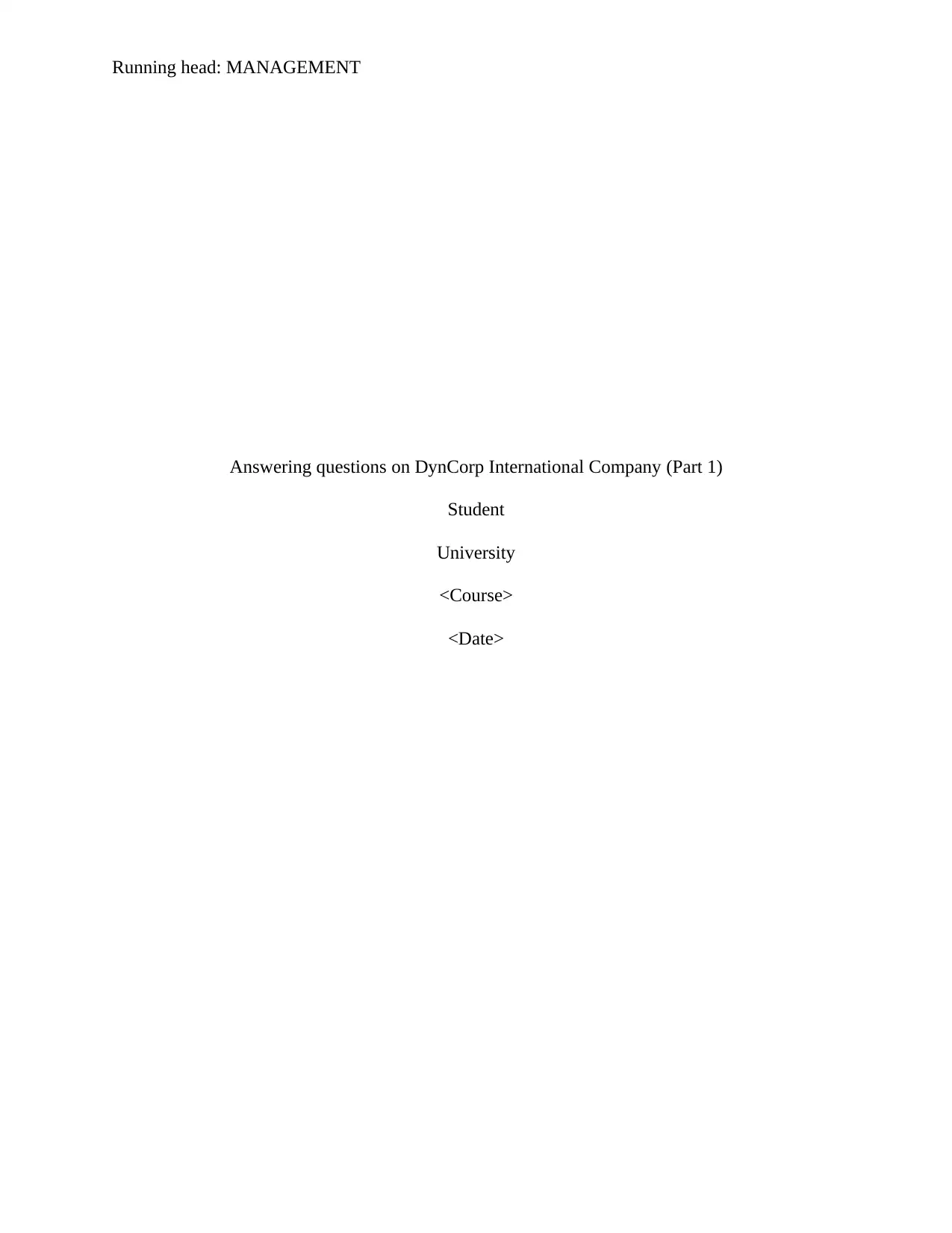
Running head: MANAGEMENT
Answering questions on DynCorp International Company (Part 1)
Student
University
<Course>
<Date>
Answering questions on DynCorp International Company (Part 1)
Student
University
<Course>
<Date>
Paraphrase This Document
Need a fresh take? Get an instant paraphrase of this document with our AI Paraphraser
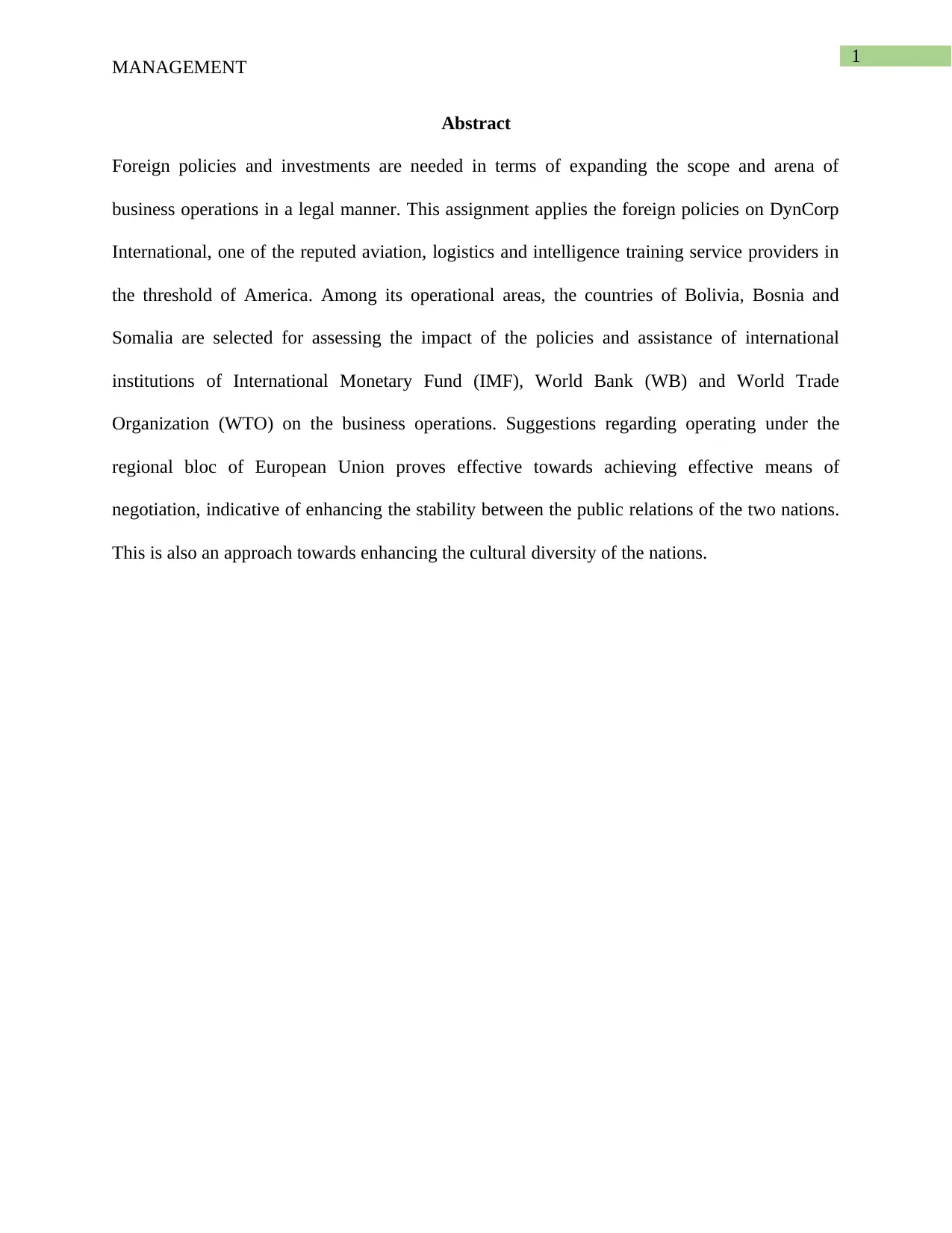
1
MANAGEMENT
Abstract
Foreign policies and investments are needed in terms of expanding the scope and arena of
business operations in a legal manner. This assignment applies the foreign policies on DynCorp
International, one of the reputed aviation, logistics and intelligence training service providers in
the threshold of America. Among its operational areas, the countries of Bolivia, Bosnia and
Somalia are selected for assessing the impact of the policies and assistance of international
institutions of International Monetary Fund (IMF), World Bank (WB) and World Trade
Organization (WTO) on the business operations. Suggestions regarding operating under the
regional bloc of European Union proves effective towards achieving effective means of
negotiation, indicative of enhancing the stability between the public relations of the two nations.
This is also an approach towards enhancing the cultural diversity of the nations.
MANAGEMENT
Abstract
Foreign policies and investments are needed in terms of expanding the scope and arena of
business operations in a legal manner. This assignment applies the foreign policies on DynCorp
International, one of the reputed aviation, logistics and intelligence training service providers in
the threshold of America. Among its operational areas, the countries of Bolivia, Bosnia and
Somalia are selected for assessing the impact of the policies and assistance of international
institutions of International Monetary Fund (IMF), World Bank (WB) and World Trade
Organization (WTO) on the business operations. Suggestions regarding operating under the
regional bloc of European Union proves effective towards achieving effective means of
negotiation, indicative of enhancing the stability between the public relations of the two nations.
This is also an approach towards enhancing the cultural diversity of the nations.
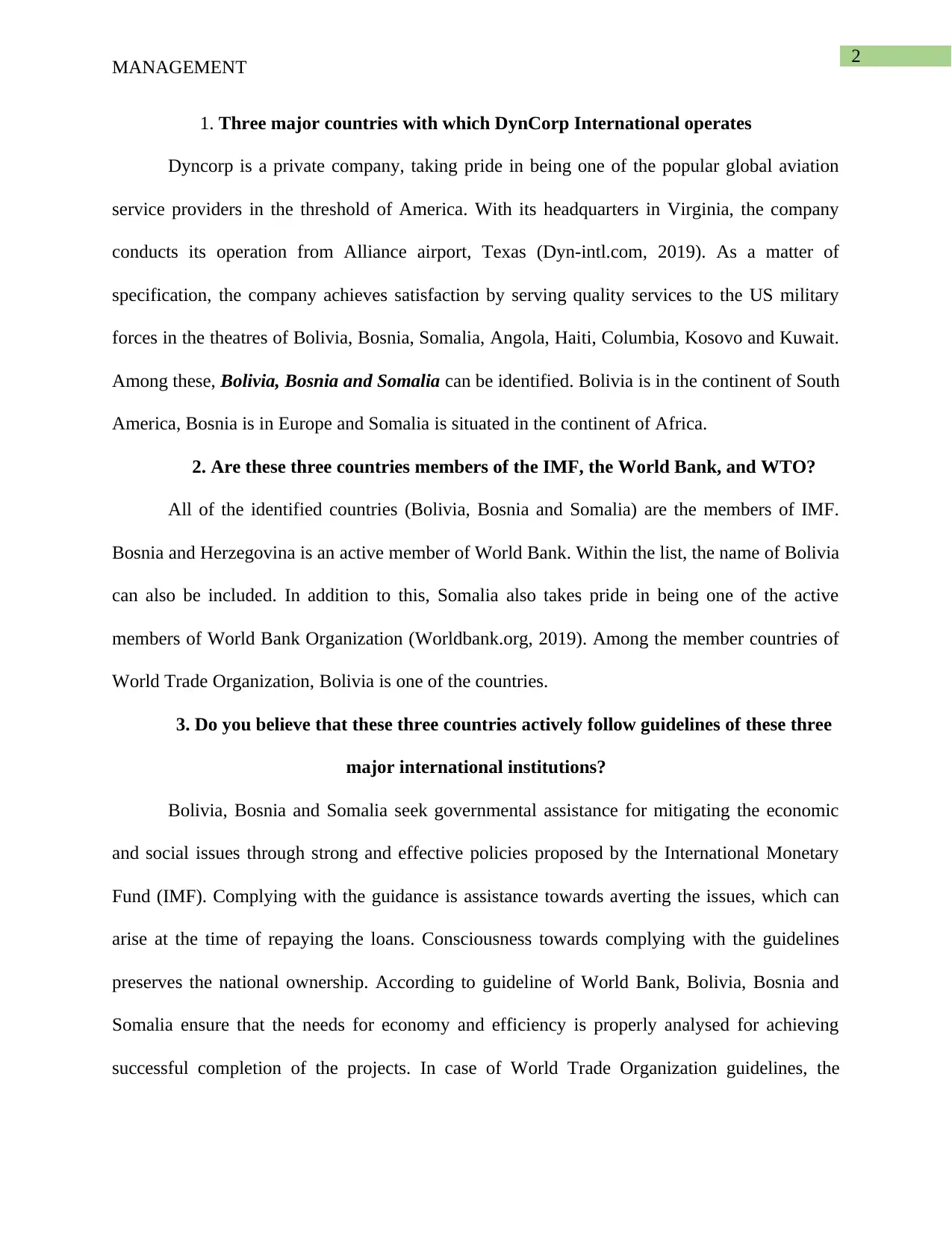
2
MANAGEMENT
1. Three major countries with which DynCorp International operates
Dyncorp is a private company, taking pride in being one of the popular global aviation
service providers in the threshold of America. With its headquarters in Virginia, the company
conducts its operation from Alliance airport, Texas (Dyn-intl.com, 2019). As a matter of
specification, the company achieves satisfaction by serving quality services to the US military
forces in the theatres of Bolivia, Bosnia, Somalia, Angola, Haiti, Columbia, Kosovo and Kuwait.
Among these, Bolivia, Bosnia and Somalia can be identified. Bolivia is in the continent of South
America, Bosnia is in Europe and Somalia is situated in the continent of Africa.
2. Are these three countries members of the IMF, the World Bank, and WTO?
All of the identified countries (Bolivia, Bosnia and Somalia) are the members of IMF.
Bosnia and Herzegovina is an active member of World Bank. Within the list, the name of Bolivia
can also be included. In addition to this, Somalia also takes pride in being one of the active
members of World Bank Organization (Worldbank.org, 2019). Among the member countries of
World Trade Organization, Bolivia is one of the countries.
3. Do you believe that these three countries actively follow guidelines of these three
major international institutions?
Bolivia, Bosnia and Somalia seek governmental assistance for mitigating the economic
and social issues through strong and effective policies proposed by the International Monetary
Fund (IMF). Complying with the guidance is assistance towards averting the issues, which can
arise at the time of repaying the loans. Consciousness towards complying with the guidelines
preserves the national ownership. According to guideline of World Bank, Bolivia, Bosnia and
Somalia ensure that the needs for economy and efficiency is properly analysed for achieving
successful completion of the projects. In case of World Trade Organization guidelines, the
MANAGEMENT
1. Three major countries with which DynCorp International operates
Dyncorp is a private company, taking pride in being one of the popular global aviation
service providers in the threshold of America. With its headquarters in Virginia, the company
conducts its operation from Alliance airport, Texas (Dyn-intl.com, 2019). As a matter of
specification, the company achieves satisfaction by serving quality services to the US military
forces in the theatres of Bolivia, Bosnia, Somalia, Angola, Haiti, Columbia, Kosovo and Kuwait.
Among these, Bolivia, Bosnia and Somalia can be identified. Bolivia is in the continent of South
America, Bosnia is in Europe and Somalia is situated in the continent of Africa.
2. Are these three countries members of the IMF, the World Bank, and WTO?
All of the identified countries (Bolivia, Bosnia and Somalia) are the members of IMF.
Bosnia and Herzegovina is an active member of World Bank. Within the list, the name of Bolivia
can also be included. In addition to this, Somalia also takes pride in being one of the active
members of World Bank Organization (Worldbank.org, 2019). Among the member countries of
World Trade Organization, Bolivia is one of the countries.
3. Do you believe that these three countries actively follow guidelines of these three
major international institutions?
Bolivia, Bosnia and Somalia seek governmental assistance for mitigating the economic
and social issues through strong and effective policies proposed by the International Monetary
Fund (IMF). Complying with the guidance is assistance towards averting the issues, which can
arise at the time of repaying the loans. Consciousness towards complying with the guidelines
preserves the national ownership. According to guideline of World Bank, Bolivia, Bosnia and
Somalia ensure that the needs for economy and efficiency is properly analysed for achieving
successful completion of the projects. In case of World Trade Organization guidelines, the
⊘ This is a preview!⊘
Do you want full access?
Subscribe today to unlock all pages.

Trusted by 1+ million students worldwide
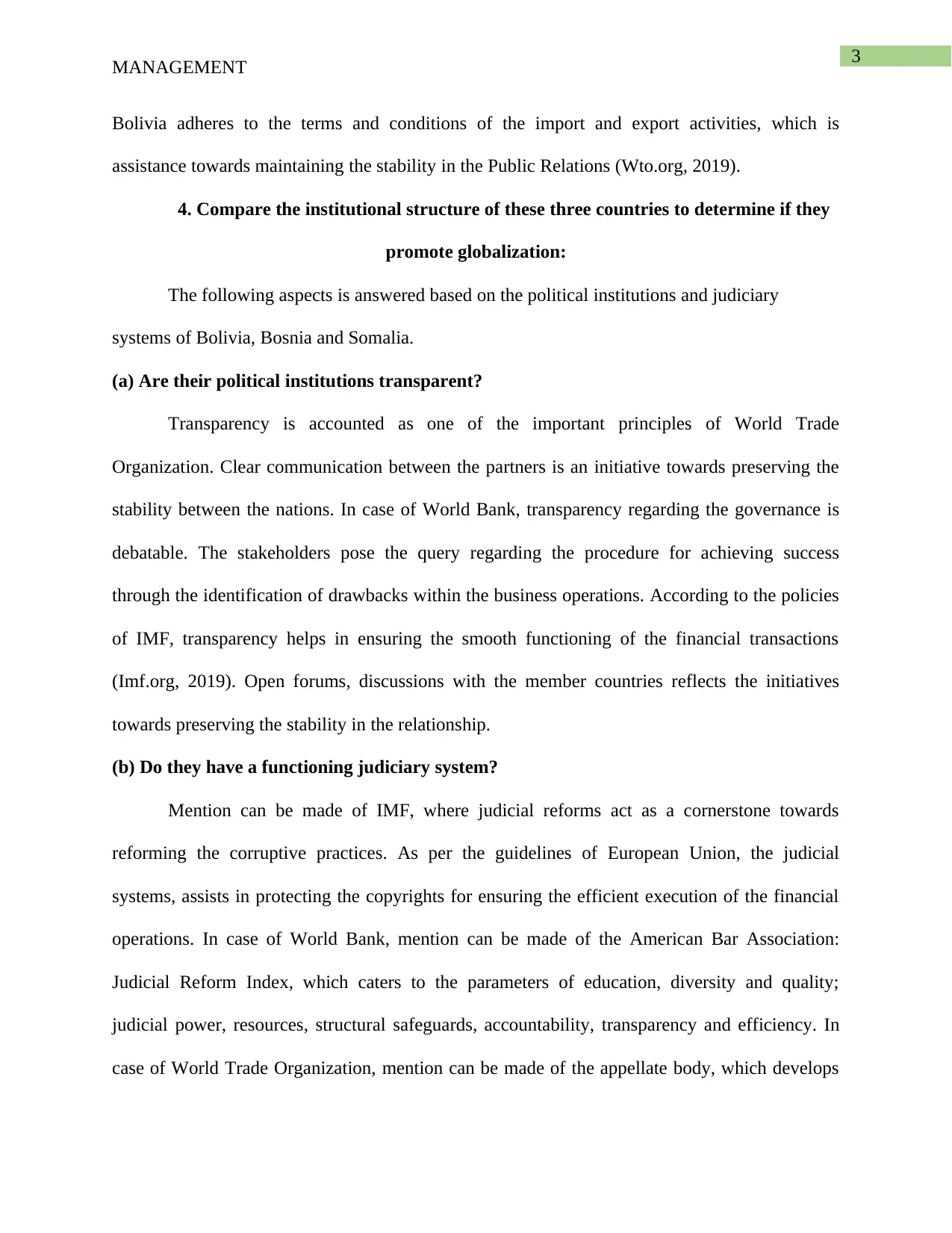
3
MANAGEMENT
Bolivia adheres to the terms and conditions of the import and export activities, which is
assistance towards maintaining the stability in the Public Relations (Wto.org, 2019).
4. Compare the institutional structure of these three countries to determine if they
promote globalization:
The following aspects is answered based on the political institutions and judiciary
systems of Bolivia, Bosnia and Somalia.
(a) Are their political institutions transparent?
Transparency is accounted as one of the important principles of World Trade
Organization. Clear communication between the partners is an initiative towards preserving the
stability between the nations. In case of World Bank, transparency regarding the governance is
debatable. The stakeholders pose the query regarding the procedure for achieving success
through the identification of drawbacks within the business operations. According to the policies
of IMF, transparency helps in ensuring the smooth functioning of the financial transactions
(Imf.org, 2019). Open forums, discussions with the member countries reflects the initiatives
towards preserving the stability in the relationship.
(b) Do they have a functioning judiciary system?
Mention can be made of IMF, where judicial reforms act as a cornerstone towards
reforming the corruptive practices. As per the guidelines of European Union, the judicial
systems, assists in protecting the copyrights for ensuring the efficient execution of the financial
operations. In case of World Bank, mention can be made of the American Bar Association:
Judicial Reform Index, which caters to the parameters of education, diversity and quality;
judicial power, resources, structural safeguards, accountability, transparency and efficiency. In
case of World Trade Organization, mention can be made of the appellate body, which develops
MANAGEMENT
Bolivia adheres to the terms and conditions of the import and export activities, which is
assistance towards maintaining the stability in the Public Relations (Wto.org, 2019).
4. Compare the institutional structure of these three countries to determine if they
promote globalization:
The following aspects is answered based on the political institutions and judiciary
systems of Bolivia, Bosnia and Somalia.
(a) Are their political institutions transparent?
Transparency is accounted as one of the important principles of World Trade
Organization. Clear communication between the partners is an initiative towards preserving the
stability between the nations. In case of World Bank, transparency regarding the governance is
debatable. The stakeholders pose the query regarding the procedure for achieving success
through the identification of drawbacks within the business operations. According to the policies
of IMF, transparency helps in ensuring the smooth functioning of the financial transactions
(Imf.org, 2019). Open forums, discussions with the member countries reflects the initiatives
towards preserving the stability in the relationship.
(b) Do they have a functioning judiciary system?
Mention can be made of IMF, where judicial reforms act as a cornerstone towards
reforming the corruptive practices. As per the guidelines of European Union, the judicial
systems, assists in protecting the copyrights for ensuring the efficient execution of the financial
operations. In case of World Bank, mention can be made of the American Bar Association:
Judicial Reform Index, which caters to the parameters of education, diversity and quality;
judicial power, resources, structural safeguards, accountability, transparency and efficiency. In
case of World Trade Organization, mention can be made of the appellate body, which develops
Paraphrase This Document
Need a fresh take? Get an instant paraphrase of this document with our AI Paraphraser
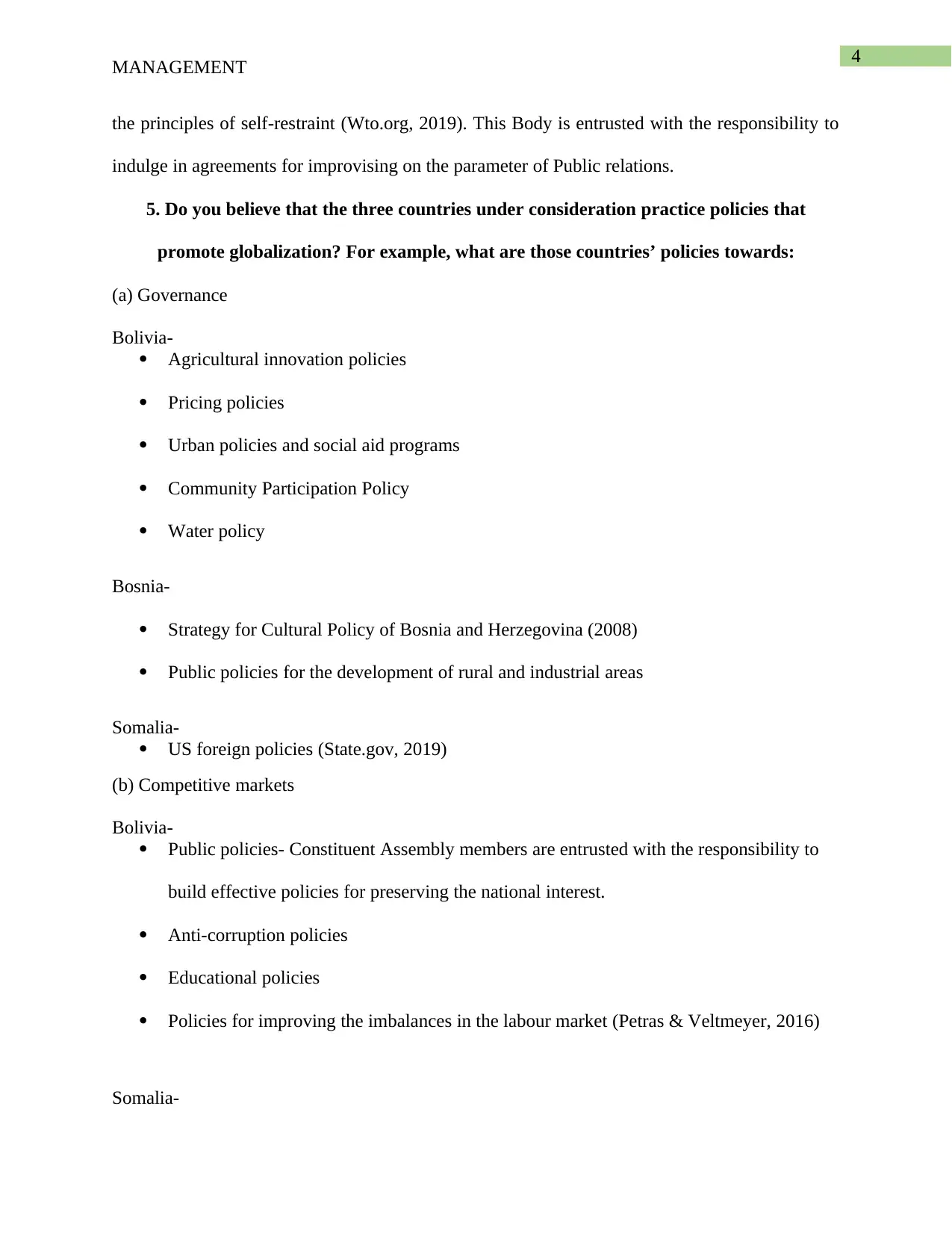
4
MANAGEMENT
the principles of self-restraint (Wto.org, 2019). This Body is entrusted with the responsibility to
indulge in agreements for improvising on the parameter of Public relations.
5. Do you believe that the three countries under consideration practice policies that
promote globalization? For example, what are those countries’ policies towards:
(a) Governance
Bolivia-
Agricultural innovation policies
Pricing policies
Urban policies and social aid programs
Community Participation Policy
Water policy
Bosnia-
Strategy for Cultural Policy of Bosnia and Herzegovina (2008)
Public policies for the development of rural and industrial areas
Somalia-
US foreign policies (State.gov, 2019)
(b) Competitive markets
Bolivia-
Public policies- Constituent Assembly members are entrusted with the responsibility to
build effective policies for preserving the national interest.
Anti-corruption policies
Educational policies
Policies for improving the imbalances in the labour market (Petras & Veltmeyer, 2016)
Somalia-
MANAGEMENT
the principles of self-restraint (Wto.org, 2019). This Body is entrusted with the responsibility to
indulge in agreements for improvising on the parameter of Public relations.
5. Do you believe that the three countries under consideration practice policies that
promote globalization? For example, what are those countries’ policies towards:
(a) Governance
Bolivia-
Agricultural innovation policies
Pricing policies
Urban policies and social aid programs
Community Participation Policy
Water policy
Bosnia-
Strategy for Cultural Policy of Bosnia and Herzegovina (2008)
Public policies for the development of rural and industrial areas
Somalia-
US foreign policies (State.gov, 2019)
(b) Competitive markets
Bolivia-
Public policies- Constituent Assembly members are entrusted with the responsibility to
build effective policies for preserving the national interest.
Anti-corruption policies
Educational policies
Policies for improving the imbalances in the labour market (Petras & Veltmeyer, 2016)
Somalia-
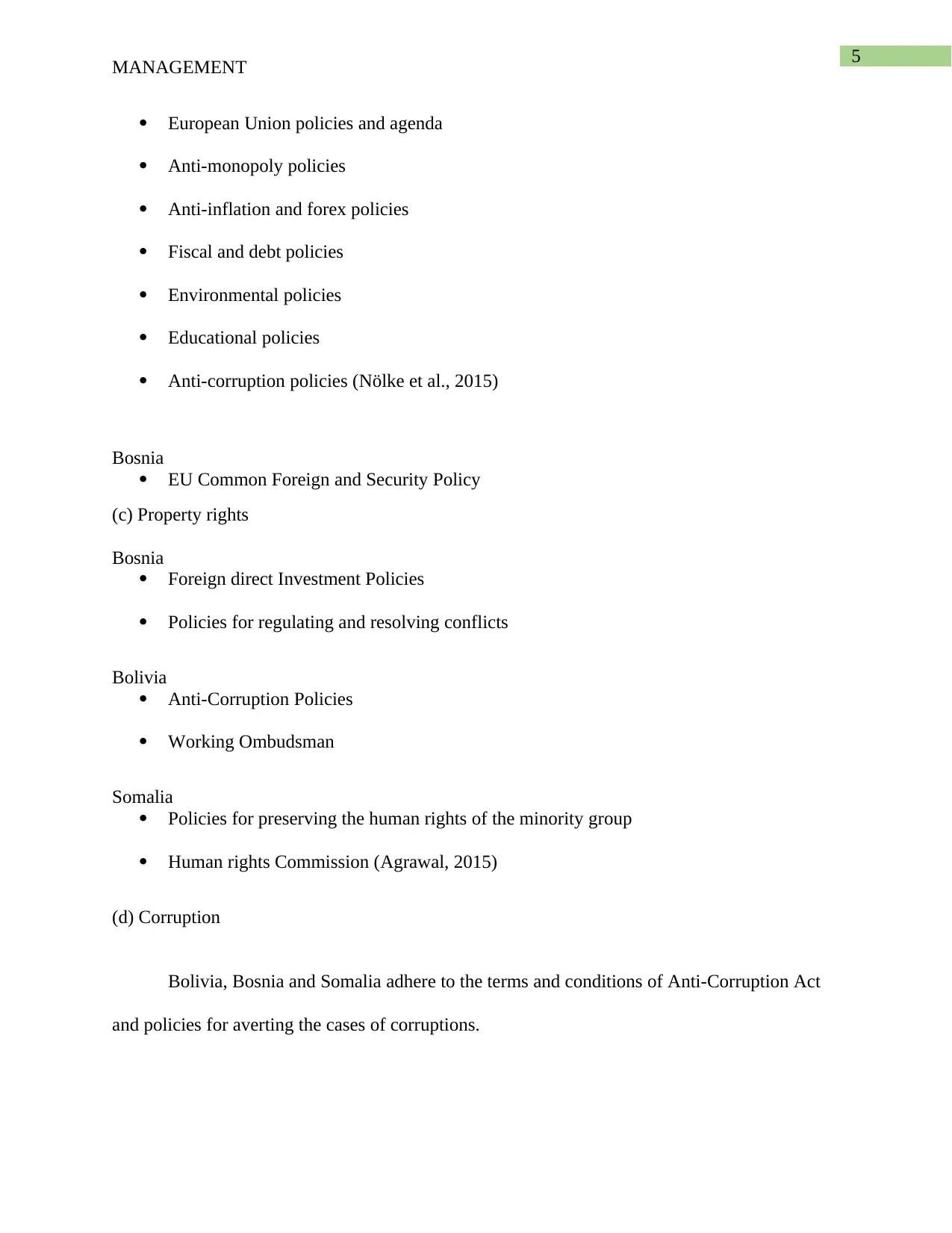
5
MANAGEMENT
European Union policies and agenda
Anti-monopoly policies
Anti-inflation and forex policies
Fiscal and debt policies
Environmental policies
Educational policies
Anti-corruption policies (Nölke et al., 2015)
Bosnia
EU Common Foreign and Security Policy
(c) Property rights
Bosnia
Foreign direct Investment Policies
Policies for regulating and resolving conflicts
Bolivia
Anti-Corruption Policies
Working Ombudsman
Somalia
Policies for preserving the human rights of the minority group
Human rights Commission (Agrawal, 2015)
(d) Corruption
Bolivia, Bosnia and Somalia adhere to the terms and conditions of Anti-Corruption Act
and policies for averting the cases of corruptions.
MANAGEMENT
European Union policies and agenda
Anti-monopoly policies
Anti-inflation and forex policies
Fiscal and debt policies
Environmental policies
Educational policies
Anti-corruption policies (Nölke et al., 2015)
Bosnia
EU Common Foreign and Security Policy
(c) Property rights
Bosnia
Foreign direct Investment Policies
Policies for regulating and resolving conflicts
Bolivia
Anti-Corruption Policies
Working Ombudsman
Somalia
Policies for preserving the human rights of the minority group
Human rights Commission (Agrawal, 2015)
(d) Corruption
Bolivia, Bosnia and Somalia adhere to the terms and conditions of Anti-Corruption Act
and policies for averting the cases of corruptions.
⊘ This is a preview!⊘
Do you want full access?
Subscribe today to unlock all pages.

Trusted by 1+ million students worldwide
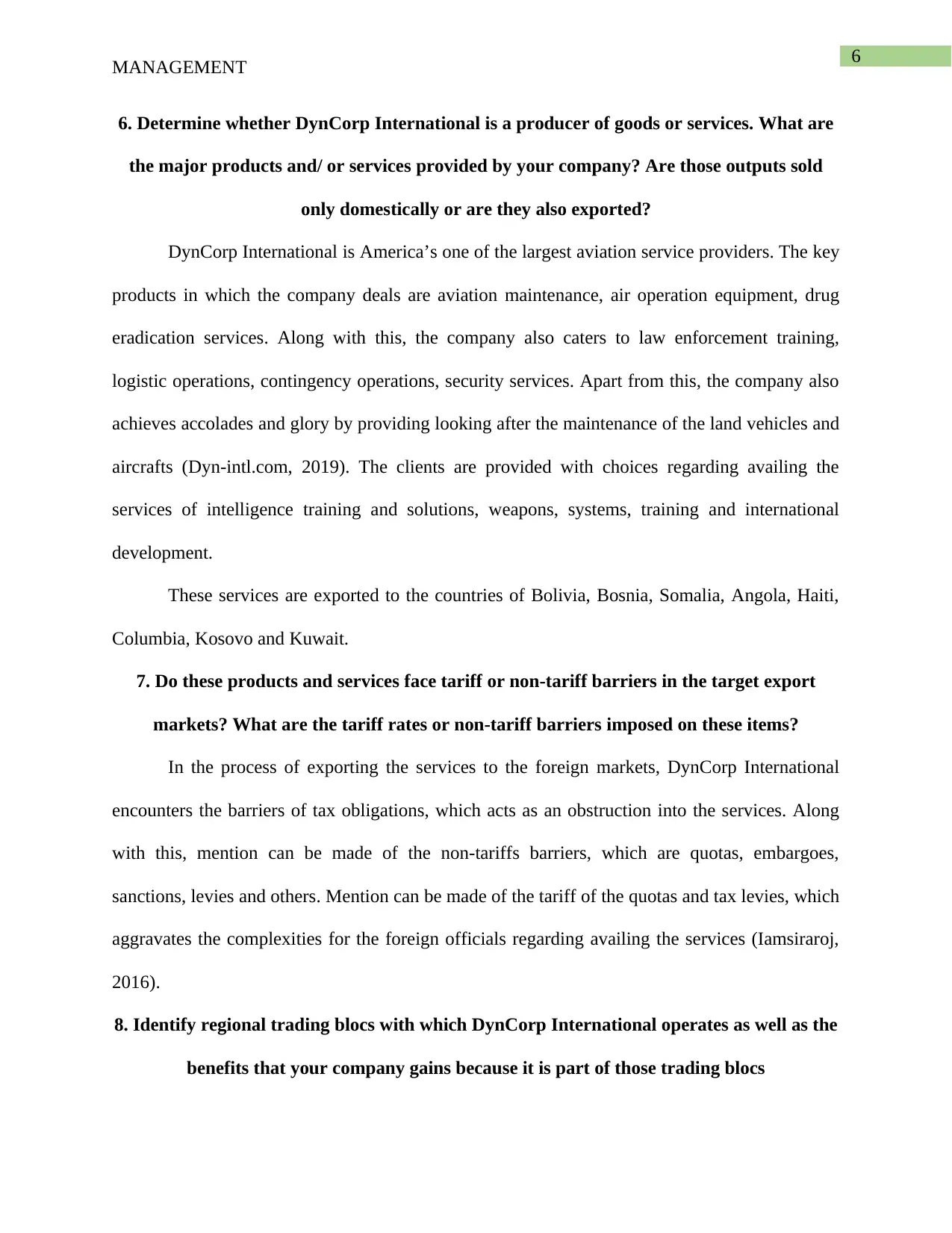
6
MANAGEMENT
6. Determine whether DynCorp International is a producer of goods or services. What are
the major products and/ or services provided by your company? Are those outputs sold
only domestically or are they also exported?
DynCorp International is America’s one of the largest aviation service providers. The key
products in which the company deals are aviation maintenance, air operation equipment, drug
eradication services. Along with this, the company also caters to law enforcement training,
logistic operations, contingency operations, security services. Apart from this, the company also
achieves accolades and glory by providing looking after the maintenance of the land vehicles and
aircrafts (Dyn-intl.com, 2019). The clients are provided with choices regarding availing the
services of intelligence training and solutions, weapons, systems, training and international
development.
These services are exported to the countries of Bolivia, Bosnia, Somalia, Angola, Haiti,
Columbia, Kosovo and Kuwait.
7. Do these products and services face tariff or non-tariff barriers in the target export
markets? What are the tariff rates or non-tariff barriers imposed on these items?
In the process of exporting the services to the foreign markets, DynCorp International
encounters the barriers of tax obligations, which acts as an obstruction into the services. Along
with this, mention can be made of the non-tariffs barriers, which are quotas, embargoes,
sanctions, levies and others. Mention can be made of the tariff of the quotas and tax levies, which
aggravates the complexities for the foreign officials regarding availing the services (Iamsiraroj,
2016).
8. Identify regional trading blocs with which DynCorp International operates as well as the
benefits that your company gains because it is part of those trading blocs
MANAGEMENT
6. Determine whether DynCorp International is a producer of goods or services. What are
the major products and/ or services provided by your company? Are those outputs sold
only domestically or are they also exported?
DynCorp International is America’s one of the largest aviation service providers. The key
products in which the company deals are aviation maintenance, air operation equipment, drug
eradication services. Along with this, the company also caters to law enforcement training,
logistic operations, contingency operations, security services. Apart from this, the company also
achieves accolades and glory by providing looking after the maintenance of the land vehicles and
aircrafts (Dyn-intl.com, 2019). The clients are provided with choices regarding availing the
services of intelligence training and solutions, weapons, systems, training and international
development.
These services are exported to the countries of Bolivia, Bosnia, Somalia, Angola, Haiti,
Columbia, Kosovo and Kuwait.
7. Do these products and services face tariff or non-tariff barriers in the target export
markets? What are the tariff rates or non-tariff barriers imposed on these items?
In the process of exporting the services to the foreign markets, DynCorp International
encounters the barriers of tax obligations, which acts as an obstruction into the services. Along
with this, mention can be made of the non-tariffs barriers, which are quotas, embargoes,
sanctions, levies and others. Mention can be made of the tariff of the quotas and tax levies, which
aggravates the complexities for the foreign officials regarding availing the services (Iamsiraroj,
2016).
8. Identify regional trading blocs with which DynCorp International operates as well as the
benefits that your company gains because it is part of those trading blocs
Paraphrase This Document
Need a fresh take? Get an instant paraphrase of this document with our AI Paraphraser
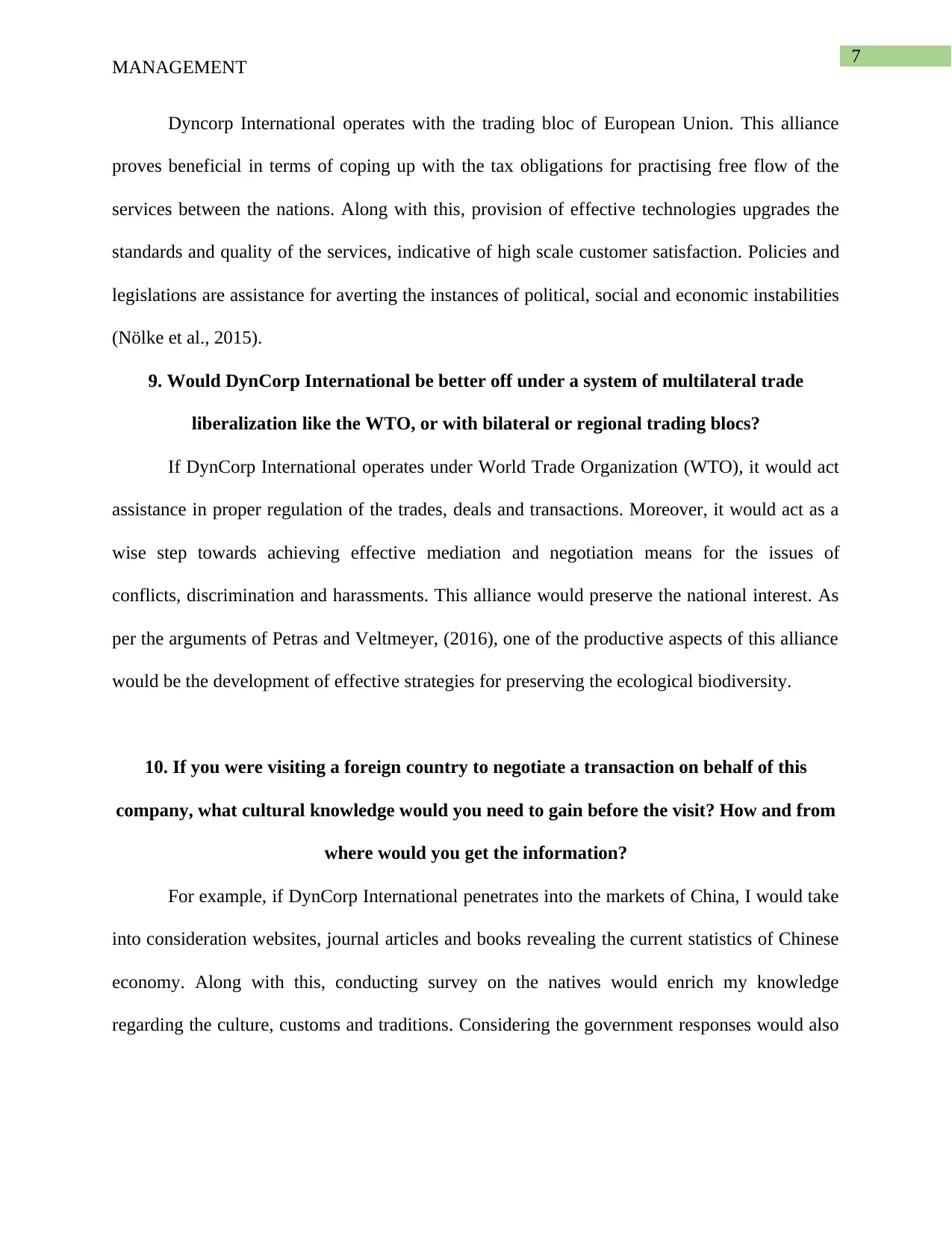
7
MANAGEMENT
Dyncorp International operates with the trading bloc of European Union. This alliance
proves beneficial in terms of coping up with the tax obligations for practising free flow of the
services between the nations. Along with this, provision of effective technologies upgrades the
standards and quality of the services, indicative of high scale customer satisfaction. Policies and
legislations are assistance for averting the instances of political, social and economic instabilities
(Nölke et al., 2015).
9. Would DynCorp International be better off under a system of multilateral trade
liberalization like the WTO, or with bilateral or regional trading blocs?
If DynCorp International operates under World Trade Organization (WTO), it would act
assistance in proper regulation of the trades, deals and transactions. Moreover, it would act as a
wise step towards achieving effective mediation and negotiation means for the issues of
conflicts, discrimination and harassments. This alliance would preserve the national interest. As
per the arguments of Petras and Veltmeyer, (2016), one of the productive aspects of this alliance
would be the development of effective strategies for preserving the ecological biodiversity.
10. If you were visiting a foreign country to negotiate a transaction on behalf of this
company, what cultural knowledge would you need to gain before the visit? How and from
where would you get the information?
For example, if DynCorp International penetrates into the markets of China, I would take
into consideration websites, journal articles and books revealing the current statistics of Chinese
economy. Along with this, conducting survey on the natives would enrich my knowledge
regarding the culture, customs and traditions. Considering the government responses would also
MANAGEMENT
Dyncorp International operates with the trading bloc of European Union. This alliance
proves beneficial in terms of coping up with the tax obligations for practising free flow of the
services between the nations. Along with this, provision of effective technologies upgrades the
standards and quality of the services, indicative of high scale customer satisfaction. Policies and
legislations are assistance for averting the instances of political, social and economic instabilities
(Nölke et al., 2015).
9. Would DynCorp International be better off under a system of multilateral trade
liberalization like the WTO, or with bilateral or regional trading blocs?
If DynCorp International operates under World Trade Organization (WTO), it would act
assistance in proper regulation of the trades, deals and transactions. Moreover, it would act as a
wise step towards achieving effective mediation and negotiation means for the issues of
conflicts, discrimination and harassments. This alliance would preserve the national interest. As
per the arguments of Petras and Veltmeyer, (2016), one of the productive aspects of this alliance
would be the development of effective strategies for preserving the ecological biodiversity.
10. If you were visiting a foreign country to negotiate a transaction on behalf of this
company, what cultural knowledge would you need to gain before the visit? How and from
where would you get the information?
For example, if DynCorp International penetrates into the markets of China, I would take
into consideration websites, journal articles and books revealing the current statistics of Chinese
economy. Along with this, conducting survey on the natives would enrich my knowledge
regarding the culture, customs and traditions. Considering the government responses would also
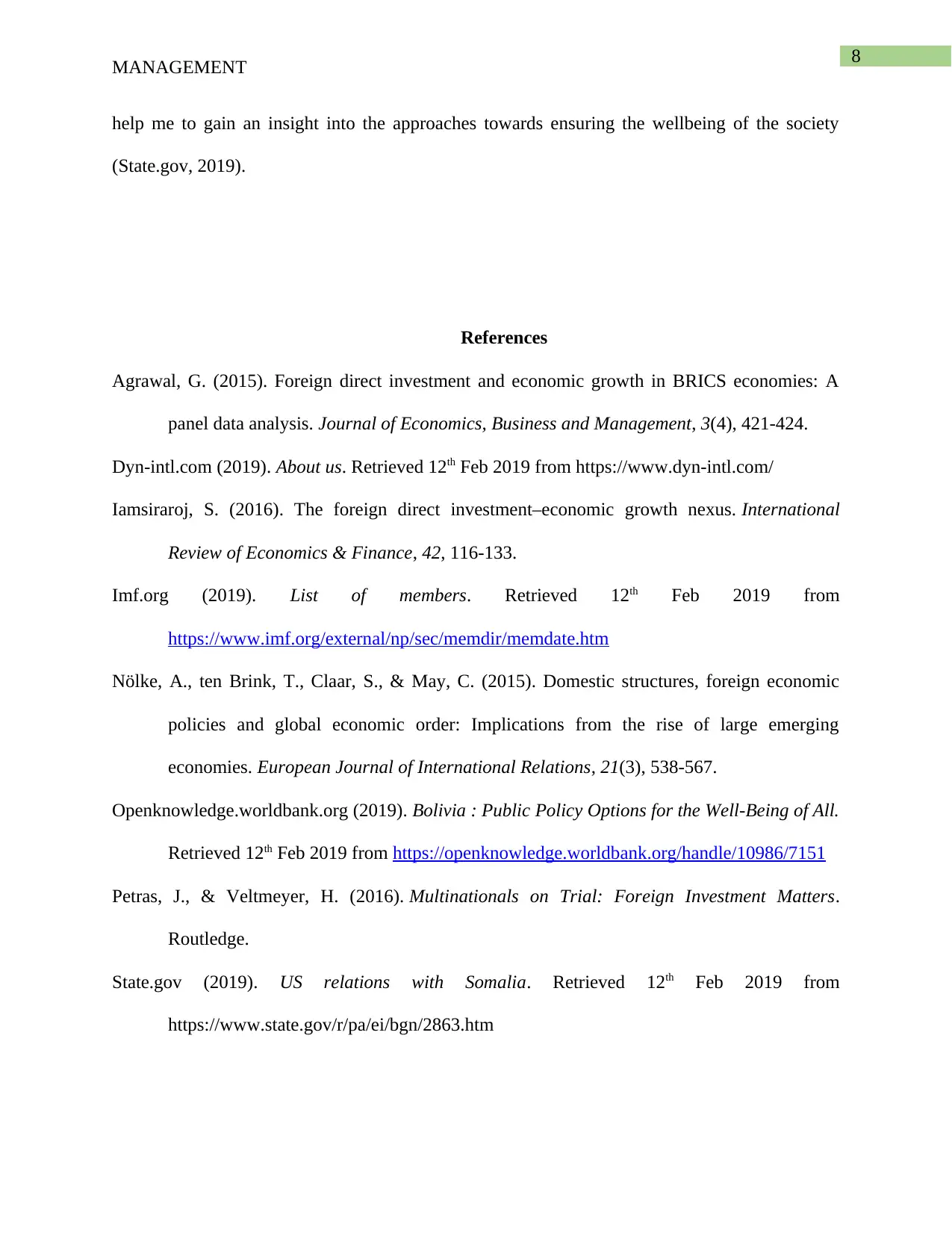
8
MANAGEMENT
help me to gain an insight into the approaches towards ensuring the wellbeing of the society
(State.gov, 2019).
References
Agrawal, G. (2015). Foreign direct investment and economic growth in BRICS economies: A
panel data analysis. Journal of Economics, Business and Management, 3(4), 421-424.
Dyn-intl.com (2019). About us. Retrieved 12th Feb 2019 from https://www.dyn-intl.com/
Iamsiraroj, S. (2016). The foreign direct investment–economic growth nexus. International
Review of Economics & Finance, 42, 116-133.
Imf.org (2019). List of members. Retrieved 12th Feb 2019 from
https://www.imf.org/external/np/sec/memdir/memdate.htm
Nölke, A., ten Brink, T., Claar, S., & May, C. (2015). Domestic structures, foreign economic
policies and global economic order: Implications from the rise of large emerging
economies. European Journal of International Relations, 21(3), 538-567.
Openknowledge.worldbank.org (2019). Bolivia : Public Policy Options for the Well-Being of All.
Retrieved 12th Feb 2019 from https://openknowledge.worldbank.org/handle/10986/7151
Petras, J., & Veltmeyer, H. (2016). Multinationals on Trial: Foreign Investment Matters.
Routledge.
State.gov (2019). US relations with Somalia. Retrieved 12th Feb 2019 from
https://www.state.gov/r/pa/ei/bgn/2863.htm
MANAGEMENT
help me to gain an insight into the approaches towards ensuring the wellbeing of the society
(State.gov, 2019).
References
Agrawal, G. (2015). Foreign direct investment and economic growth in BRICS economies: A
panel data analysis. Journal of Economics, Business and Management, 3(4), 421-424.
Dyn-intl.com (2019). About us. Retrieved 12th Feb 2019 from https://www.dyn-intl.com/
Iamsiraroj, S. (2016). The foreign direct investment–economic growth nexus. International
Review of Economics & Finance, 42, 116-133.
Imf.org (2019). List of members. Retrieved 12th Feb 2019 from
https://www.imf.org/external/np/sec/memdir/memdate.htm
Nölke, A., ten Brink, T., Claar, S., & May, C. (2015). Domestic structures, foreign economic
policies and global economic order: Implications from the rise of large emerging
economies. European Journal of International Relations, 21(3), 538-567.
Openknowledge.worldbank.org (2019). Bolivia : Public Policy Options for the Well-Being of All.
Retrieved 12th Feb 2019 from https://openknowledge.worldbank.org/handle/10986/7151
Petras, J., & Veltmeyer, H. (2016). Multinationals on Trial: Foreign Investment Matters.
Routledge.
State.gov (2019). US relations with Somalia. Retrieved 12th Feb 2019 from
https://www.state.gov/r/pa/ei/bgn/2863.htm
⊘ This is a preview!⊘
Do you want full access?
Subscribe today to unlock all pages.

Trusted by 1+ million students worldwide
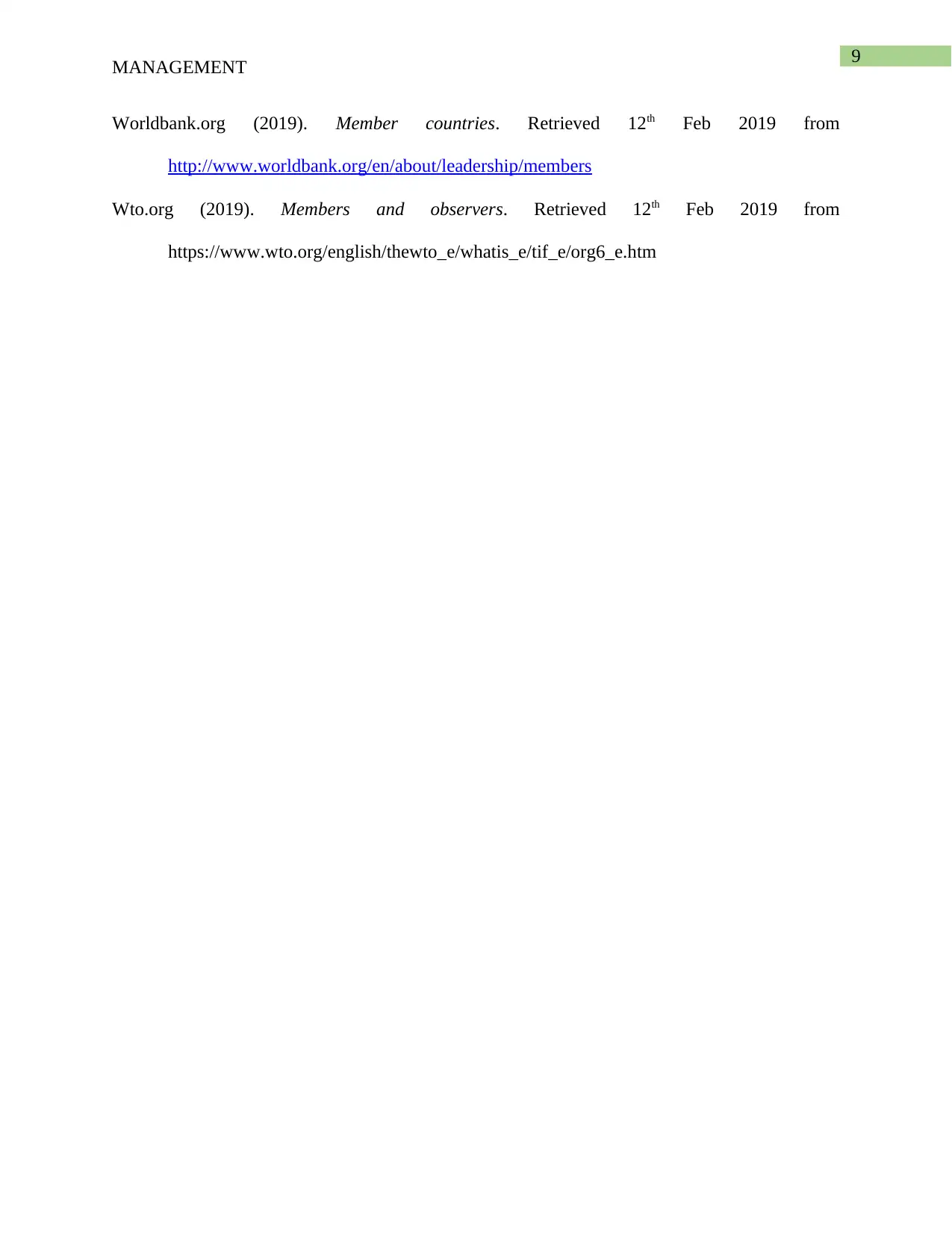
9
MANAGEMENT
Worldbank.org (2019). Member countries. Retrieved 12th Feb 2019 from
http://www.worldbank.org/en/about/leadership/members
Wto.org (2019). Members and observers. Retrieved 12th Feb 2019 from
https://www.wto.org/english/thewto_e/whatis_e/tif_e/org6_e.htm
MANAGEMENT
Worldbank.org (2019). Member countries. Retrieved 12th Feb 2019 from
http://www.worldbank.org/en/about/leadership/members
Wto.org (2019). Members and observers. Retrieved 12th Feb 2019 from
https://www.wto.org/english/thewto_e/whatis_e/tif_e/org6_e.htm
1 out of 10
Related Documents
Your All-in-One AI-Powered Toolkit for Academic Success.
+13062052269
info@desklib.com
Available 24*7 on WhatsApp / Email
![[object Object]](/_next/static/media/star-bottom.7253800d.svg)
Unlock your academic potential
Copyright © 2020–2025 A2Z Services. All Rights Reserved. Developed and managed by ZUCOL.





